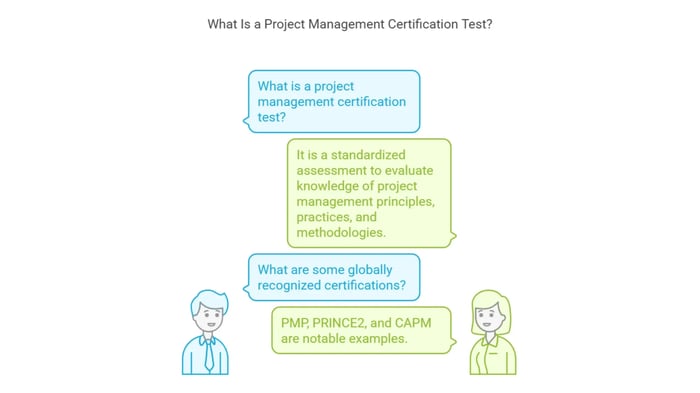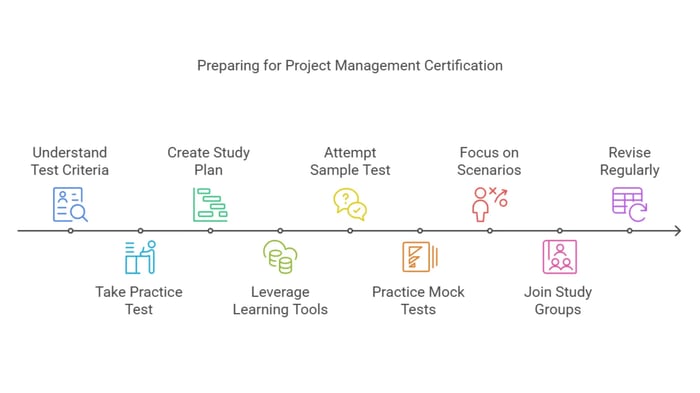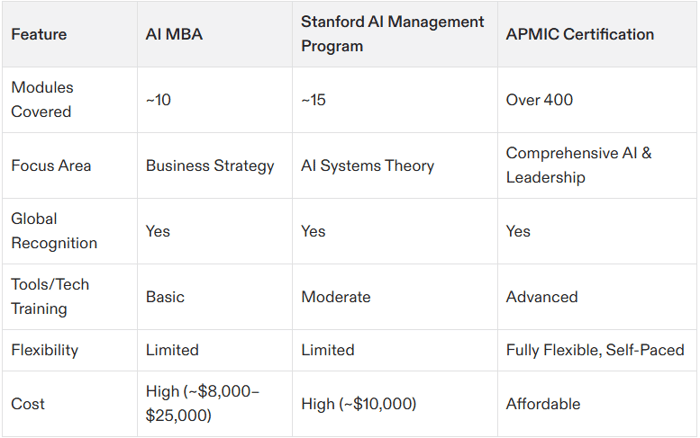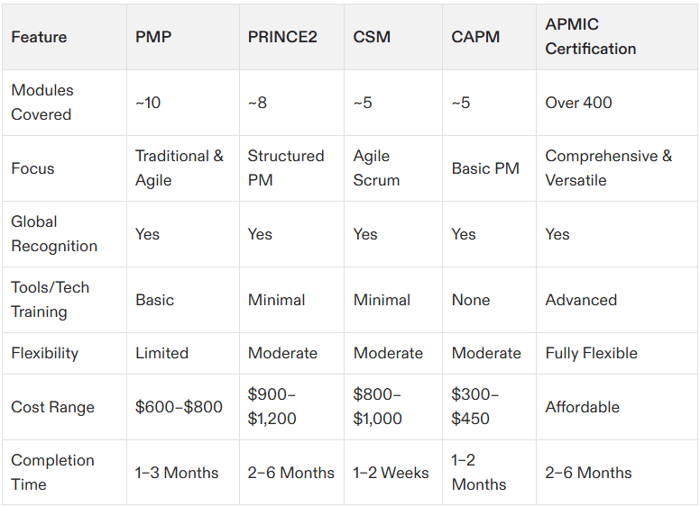Table of Contents
- What Is a Project Management Certification Test?
- What to Expect in the Project Management Certification Test in 2025?
- Steps to Prepare for Your Project Management Certification Test in 2025
- 1. Understand the Test Criteria
- 2. Take a Project Management Certification Practice Test
- 3. Create a Study Plan
- 4. Leverage Interactive Learning Tools
- 5. Attempt a Project Management Certification Sample Test
- 6. Practice Time-Bound Mock Tests
- 7. Focus on Real-World Scenarios
- 8. Join Study Groups or Classes
- 9. Revise Regularly
- Why Choose APMIC for Certification Prep?
- 2025 Trends in Project Management Certification
- Final Thoughts
- Common Questions About Project Management Certification Test
Project management has become a critical skill in today's fast-paced industries, with certifications serving as a gold standard for credibility and expertise. The project management certification test is your gateway to these prestigious credentials. Whether you’re preparing to lead complex projects or refine your knowledge with industry-backed frameworks, this guide will help you succeed.
In this blog post, we’ll dig into everything you need to know about the project management certification test. From understanding the test's structure to exploring top preparation resources like the APMIC platform, this guide has it all.
What Is a Project Management Certification Test?
A project management certification test is a standardized assessment designed to evaluate your knowledge of project management principles, practices, and methodologies.

Some of the globally recognized certifications include:
PMP (Project Management Professional) – Offered by PMI, it is one of the most sought-after certifications worldwide.
PRINCE2 (Projects IN Controlled Environments) – A structured project management method used extensively in Europe and Australia.
CAPM (Certified Associate in Project Management) – Ideal for entry-level project managers.
Passing this test demonstrates that you have the skills necessary to manage projects effectively, making you a valuable asset to companies seeking efficiency and results.
Why the Certification Test Matters?
Provides credibility in the job market
Hones your technical and strategic management abilities
Increases salary potential—certified project managers often earn significantly more
What to Expect in the Project Management Certification Test in 2025?
With technological advancements and an increased emphasis on real-world project challenges, certification tests in 2025 have become more comprehensive.
Many exams now incorporate case studies, adaptive learning assessments, and scenario simulations to gauge a candidate’s practical decision-making abilities. Additionally, candidates can expect questions focusing on hybrid project management approaches, agile methodologies, and risk management in uncertain environments. Understanding the test blueprint and focusing on key domains such as leadership, business acumen, and technical project management is crucial for success.
The structure and format of a project management certification test can vary by certification program, but typically includes:
Multiple-choice, scenario-based questions
Questions testing theoretical knowledge and real-world application
A time limit, requiring excellent time management skills
For example, the PMP exam in 2025 includes 180 questions encompassing three domains:
People – Interpersonal skills and leadership
Process – Project methodologies and best practices
Business Environment – Aligning projects with company goals
Pro Tip:
Familiarize yourself with the domain weightage and question split to tailor your preparation efforts. Utilize interactive tools like APMIC, which provides robust modules tailored for each domain.
Steps to Prepare for Your Project Management Certification Test in 2025
Understanding the eligibility criteria is essential to ensure you meet all requirements before registering for the exam. Each certification has specific prerequisites regarding work experience, educational background, and sometimes mandatory training courses. Researching these criteria in advance prevents last-minute surprises and allows you to plan accordingly.
Additionally, some certification programs offer alternative pathways, such as CAPM for those who lack prior experience but want to build a foundation in project management. Reviewing official exam handbooks and seeking guidance from certified professionals can also help clarify any doubts regarding test eligibility.

1. Understand the Test Criteria
Every certification board outlines specific prerequisites for eligibility. For example, PMP requires:
A four-year degree
36 months of project management experience
35 hours of project management education
Research the test requirements early to ensure you qualify.
2. Take a Project Management Certification Practice Test
A project management certification practice test allows you to simulate the actual exam and understand the question format. Taking multiple practice tests will help in:
Identifying weak areas
Improving time management
Building confidence for the real exam
Many online platforms, including APMIC, offer real-time practice tests that mirror the exam structure.
3. Create a Study Plan
Time management is as critical in preparation as it is in project execution. Break your study schedule into mini-goals and steadily focus on different topics across weeks or months.
Week 1-2: Fundamentals and key concepts
Week 3-4: Exam domains and methodologies
Week 5-6: Hands-on problem-solving
Week 7-8: Full-length practice tests
4. Leverage Interactive Learning Tools
Using technology-backed platforms like APMIC can drastically improve your preparation. The platform hosts 400+ comprehensive modules, including:
Practice tests
Interactive quizzes
Scenario-based questions
AI-driven adaptive learning modules
5. Attempt a Project Management Certification Sample Test
A project management certification sample test is a shorter version of the full-length test, offering a snapshot of what to expect. These sample tests help in:
Familiarizing yourself with question patterns
Practicing quick decision-making
Reinforcing core concepts
6. Practice Time-Bound Mock Tests
Mock tests help you develop speed and accuracy. By replicating exam conditions, you can also reduce test-day jitters.
7. Focus on Real-World Scenarios
Many questions draw from practical challenges and problem-solving scenarios. Gaining hands-on experience as a project team member can give you an edge.
8. Join Study Groups or Classes
Collaborating in study groups or enrolling in certification prep courses ensures you’re part of a community that offers insights, clarifies doubts, and motivates you to stay the course.
9. Revise Regularly
Repetition is key to retaining complex concepts. Use flashcards, flowcharts, or digital apps that enable spaced-repetition learning—a scientifically proven method for memory improvement.
More: Explore certification test questions to familiarize yourself with the exam format.
Why Choose APMIC for Certification Prep?
The APMIC program offers tailored resources for individuals preparing for the increasingly challenging project management certification test. Here are its standout features:
A module library of 400+ resources covering every aspect of project management
Interactive tools to improve theoretical understanding and practical application
Real-world scenarios curated by industry experts
Diagnostic tools to track progress and ensure continuous improvement
Bonus: Check out the practice test guide to assess your readiness and improve your performance.
2025 Trends in Project Management Certification
As we move further into 2025, project management continues to evolve. Here are some emerging trends shaping the project management certification test:

Increased focus on AI and automation – Many tests now include modules on AI-driven project management tools.
Remote team management – The ability to manage global, remote teams is now a core skill tested.
Sustainability in project management – Environmental and social governance (ESG) practices are becoming integral.
Agile and hybrid methodologies – Certifications now emphasize Agile, Scrum, and hybrid approaches.
Final Thoughts
A project management certification test is your stepping stone to an enriched career. By following a structured preparation plan, leveraging platforms like APMIC, and fostering real-world understanding, you significantly boost your chances of success.
Whether you’re aspiring to land a dream job or lead multi-million-dollar projects, earning a project management certification will undoubtedly set you apart.
Your preparation starts here—embrace the challenge today and equip yourself for tomorrow’s leadership roles.
Common Questions About Project Management Certification Test
Q1. What is the passing score for most project management certification tests?
The passing score varies by certification but typically ranges from 61% to 70%. Check the specific certification board’s guidelines for accuracy.
Q2. How long does it take to prepare for the certification test?
Preparation timelines depend on your experience level:
Beginners: 3-6 months
Seasoned professionals: 4-6 weeks
Q3. Are practice exams necessary?
Absolutely. Practice exams help you gauge your readiness, identify weak areas, and get comfortable with the exam format.
Q4. Can I retake the certification test if I fail?
Most certification boards allow retakes, though they may charge a retake fee. It’s crucial to understand the retake policy of your chosen certification program.
Q5. Is APMIC useful for seasoned project managers?
Yes! APMIC’s modules cater to all experience levels and can help even seasoned managers refine their skills and stay updated with evolving methodologies.





